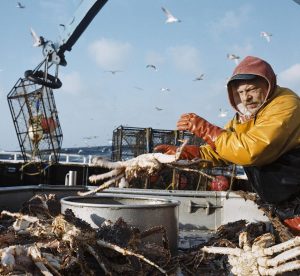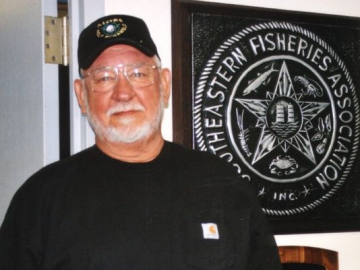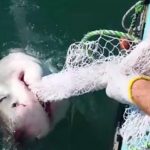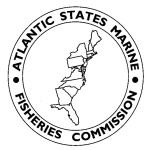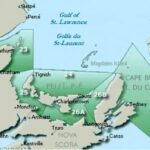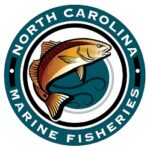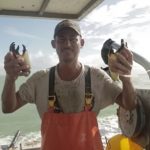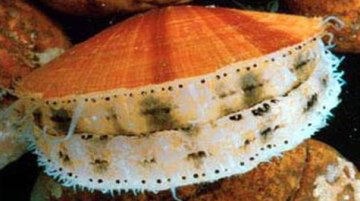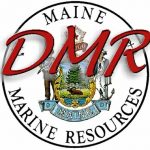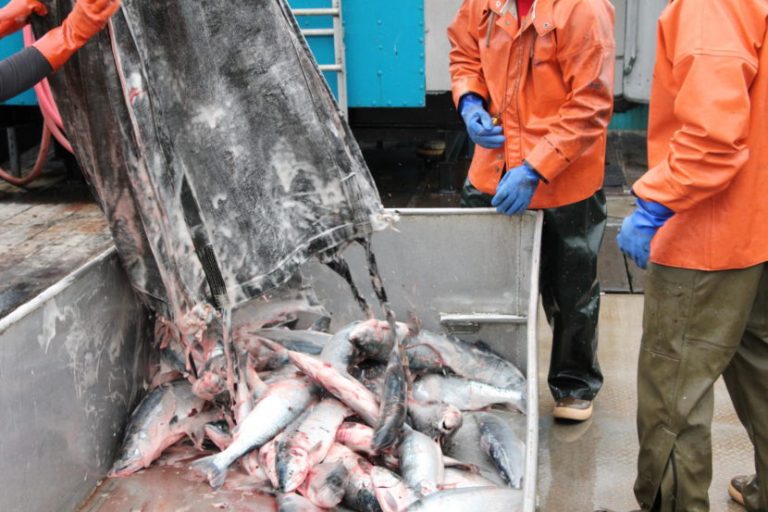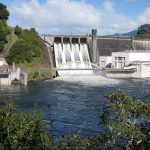Category Archives: Caribbean
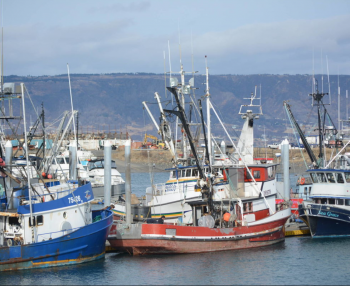
Congress considering safety, climate change for fisheries
Congress is getting involved in fisheries in a couple key areas: safety and climate change. The FISH SAFE Act, and, Climate Ready Fisheries Act of 2019. Republican Rep. Don Young is leading a bipartisan effort along with Rep. Jared Golden (D, Maine) to improve safety, introducing the Funding Instruction for Safety Health, and Security Avoids Fishing Emergencies Act.,,, The most recent climate change legislation, also bipartisan, was introduced by Rep. Joe Cunningham, (D- S.C), and is co-sponsored by Reps Brian Mast (R-Fla.), Francis Rooney (R-Fla.) and Jared Huffman (D-Calif.), and is meant to help “low country” fishermen, but the impact, should it pass, would presumably help fishermen nation-wide. >click to read< 21:51

Huffman Gets Bleak Input on Fisheries
On Oct. 5, North Coast Congressman Jared Huffman held a public meeting in Arcata to discuss updating the Magnuson-Stevens Fishery Conservation and Management Act (MSA), the federal legislation that governs ocean fishing. Huffman brought together a roundtable of regional and local officials, a Humboldt State University professor and a few representatives of the local fishing industry to offer feedback on the failings — and successes — of the MSA. >click to read< 10:22
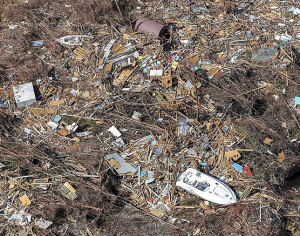
Hurricane Dorian ‘Totally Destroys’ 80% Of Fishing Industry
Fishermen yesterday said Hurricane Dorian had “totally destroyed” 80 percent of the industry in Abaco and Grand Bahama amid uncertainty over how the government will aid recovery. “Eighty percent of the fisheries sector in Grand Bahama and Abaco is totally destroyed. We’re not sure what the government will do to help us after Dorian,” said Keith Carroll, the Bahamas Commercial Fishers Alliance’s (BCFA) vice-chairman. >click to read< 10:38
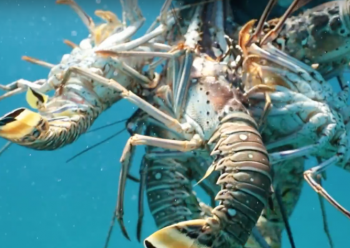
Bahamas: Hurricane Dorian impact a “big setback” for fishing industry
Bahamian fishermen fear that Hurricane Dorian’s destruction in the northern Bahamas will result in the fishing industry losing as much as 30 to 40 per cent in revenue, with the Bahamas Commercial Fishers Alliance (BCFA) vice-president saying “it’s going to be a big setback for the industry”. Keith Carroll told Eyewitness News that at least 95 per cent of fishermen in the northern Bahamas have lost their boats. >click to read< 11:34
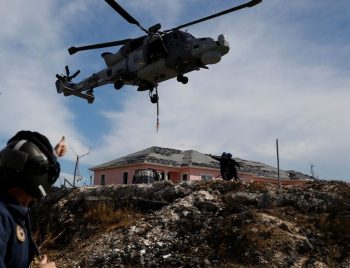
Hurricane Dorian relief effort, thousands in need of help, at least 30 dead.
An international relief effort picked up across the Bahamas on Thursday after Hurricane Dorian, one of the most intense storms ever to hit the Caribbean, swept across the islands leaving at least 30 people dead and thousands missing. Bahamian Health Minister Duane Sands said the dead were from the worst-hit Abaco and Grand Bahama islands, which are home to about 70,000 people and where about 50 percent of homes are thought to have been either destroyed or severely damaged. >click to read< 10:35
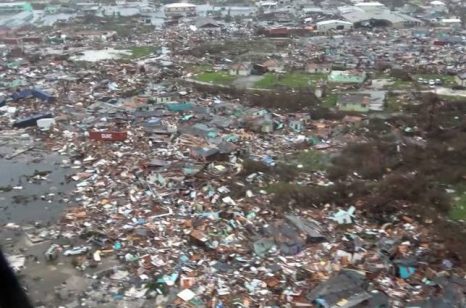
Aerial views of Hurricane Dorian shows absolute destruction in Bahamas
Some of the first images of the northern Bahamas after Hurricane Dorian has passed are coming in showing whole neighborhoods and even streets destroyed. First as a Category 5 storm and eventually a Category 3, Hurricane Dorian left catastrophic damage and people stranded in flooded areas on Abaco and the Grand Bahama islands. About 73,000 people live on those islands. Video, >click to read< 18:41
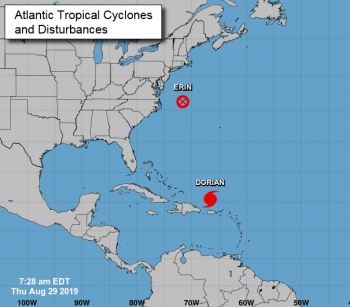
Hurricane Dorian Moving Northwest Across the Atlantic; Major Hurricane Possible Over Florida or Georgia This Weekend
Hurricane Dorian is forecast to strengthen to a major hurricane while shifting north of the Bahamas through Saturday. The risk of dangerous storm surge and hurricane-force winds later this week and this weekend continues to increase in the central and northwestern Bahamas and along the Florida east coast. Heavy rain from Dorian may cause life-threatening flash floods, NWS, >click to read< 10:06
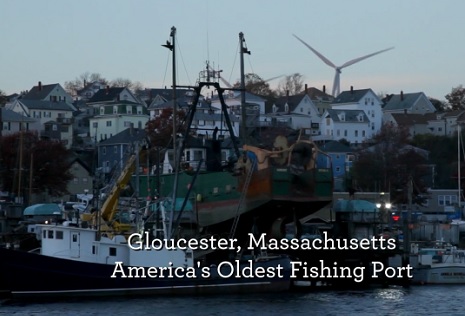
FISH & MEN: A film on the High Cost of Cheap Fish
We hope the fishing families and pioneers featured in this film will inspire a movement,,, For centuries, cod fed the world and helped build a nation. Nowhere was that more so than in Gloucester, Massachusetts – America’s oldest fishing port. But, today all that has changed… From California to Maine, small fishing communities struggle to survive. The iconic American fisherman is in a perfect storm of foreign competition, erratic regulations and rising costs. Trailer, photo’s, of some of the best people on the planet. Please support this effort. >click to read< 14:51
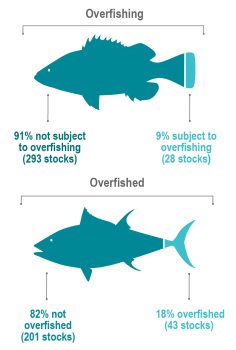
2018 Report to Congress on the Status of U.S. Fisheries
Number of US fish stocks at sustainable levels remains near record high – Today, the National Oceanic and Atmospheric Administration (NOAA) released the Status of U.S. Fisheries Annual Report to Congress, which details the status of 479 federally-managed stocks or stock complexes in the U.S. to identify which stocks are subject to overfishing, are overfished, or are rebuilt to sustainable levels. >click here to read a rundown of the report< To read the report, 2018 Report to Congress on the Status of U.S. Fisheries >click here< 15:26
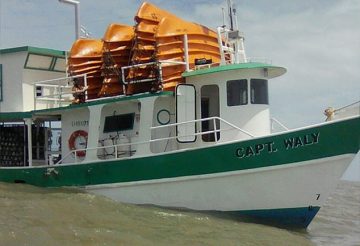
At least 27 dead and nine missing after fishing vessel capsizes off the coast of Honduras as authorities scramble to rescue more
At least 27 fishermen drowned and another nine are still missing after a vessel capsized on Wednesday during bad weather off the northern coast of Honduras. The Honduran military rescued 55 from the ‘Capitán Waly’, which set out from Port Ceiba on July 1 to net lobster. Hitting stormy weather, the boat went down some 80 nautical miles from the coast near the Gorda Keys, northeast of the easternmost point of the Honduran coast. >click to read< 16:59
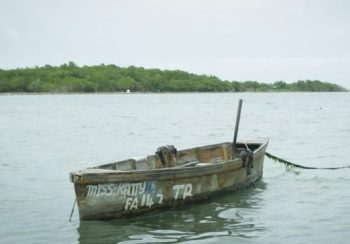
ACLU Alleges Coast Guard Detained and Abused Fishermen
One night in the fall of 2017, four Jamaican fishermen set out into the Caribbean from the village of Half Moon Bay. As a lawsuit filed today describes it, their quest for tuna and snapper was supposed to last about two days. Then they disappeared. Five weeks later, those men—Robert Dexter Weir, Patrick Wayne Ferguson, Luther Fian Patterson, and David Roderick Williams—reemerged in Miami, covered in burns and blisters, according to the American Civil Liberties Union. United States Coast Guard officers had snatched them off their boat on suspicion of marijuana smuggling, then held them at sea for more than a month, shuffling them among various vessels en route to the U.S. to face trial, alleges the ACLU, which is suing the Coast Guard on the men’s behalf. >click to read<18:47 Weir v. U.S. – Complaint – >click to read<
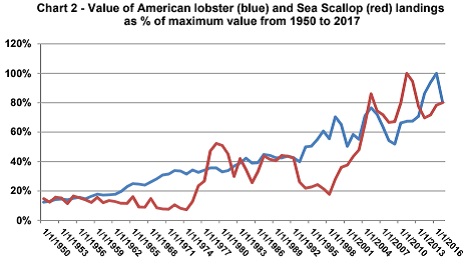
After over forty years of NOAA/NMFS management how are we really doing? Nils Stolpe
The Magnuson-Stevens Fishery Conservation and Management Act – I have seen the focus of government fisheries manage-ment increasingly shift away from the fishermen to the fish. The provisions of the Act as it was originally written were put in place to allow the U.S. fishing industry to regain control of the fisheries in the United States’ highly productive coastal waters,,, The legislation was singularly effective, so effective that within ten years or so of its passage the greatest portion of our domestic fish and shellfish production was being harvested by U.S. fishermen on U.S. vessels. This success was sold to the U.S. public – and the U.S. politicians – as an assault on the “sanctity” of our coastal waters by a burgeoning environmental industry that was (and still is) engaged in non-governmental empire building. This has resulted in a handful of multi-national ENGOs (Environmental Non-Governmental Organizations) that have become at least as influential as the fishing industry in national and international fisheries management. >click to read, and review the links and graphs<16:10
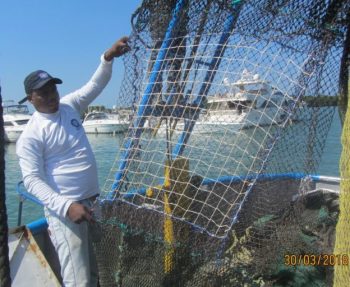
New nets make shrimp trawling more sustainable in Latin America and Caribbean
The FAO is conducting the project, known as The Sustainable Management of Bycatch in Latin America and Caribbean Trawl Fisheries (REYBAC LAC II), between 2015 and 2020 with the intention of meeting international guidelines for the responsible management of bycatch. With the help of traditional and large-scale fishers, the project consists of testing net prototypes that reduce the negative effects of trawling on marine biodiversity while still catching shrimp. The new nets have different characteristics than those usually used by fishers, mainly in regard to the size of the holes in the fabric of the net. >click to read<10:34
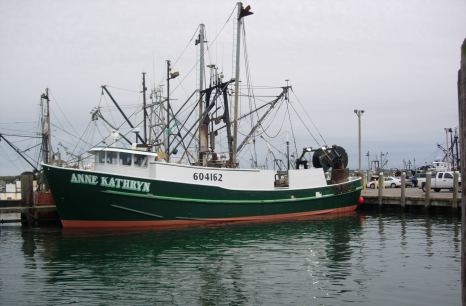
OUT TO CATCH THE LAST FISH? Fisheries “expert’s” anti-fisherman rhetoric gets taken to task!
“…most fishermen always want to catch more fish, regardless of how many there are.” This quote from the fisheries “expert” in the article, Warming waters spark marine migration, fish wars >click to read<on the warming ocean, and Joel’s subsequent comment, “And here in lies the problem. Look at what this cubical entrenched pencil pushing empty suit thinks of fishermen. Folks like this need to be taken to task”, inspired a re-post of this anti-fishing propaganda article, OUT TO CATCH THE LAST FISH? It’s a few years old, but sadly, as current as ever! To be a fisherman, these days, is to have first-hand knowledge of bias and mindless prejudice. Manipulating commercial fishing to save the stocks from “endangerment” and worse, has often been job justification for the political and personal agenda-driven, obsequious, career-climbing government fisheries “scientists” and managers. “Destructive” commercial fishing is also a handy foil for corporate style environmental groups’ fund raising efforts; and diminishing the importance of domestic commercial fishing is also a necessary step in the energy industry’s march into the sea. >click to read< Thank you, Dick.17:02
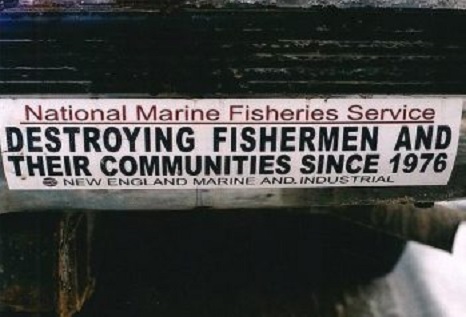
How to wreck an industry – Catch shares lead to consolidation of Alaskan fisheries
A recent study documenting consolidation and specialization in Alaska’s fisheries over the past three decades illustrates a broader trend taking hold in coastal communities across the country. Catch share programs, a new fisheries management system, are turning fishing rights into tradable commodities, driving up the cost to fish and consolidating fishing rights into the hands of a few wealthy owners. For instance, in Alaska’s Bering Sea crab fishery, just four companies own 77 percent of the rights to fish a single crab species. >click to read<11:30

Our coastal communities are drowning, largely thanks to tradable quotas and licences.
British Columbia’s coastal communities, long dependent on fishing for their livelihoods, are in serious trouble: population down, youth retention down, incomes down, investment down, infrastructure down, health and well-being down. It’s now almost impossible for young people to enter the fishery because of the high cost of purchasing or leasing the Individual Transferable Quotas (ITQs) attached to most fishing licences. ITQs are permits to catch a certain quantity of fish, and can be freely traded or leased. Coastal communities that used to have dozens of fishermen now may have a handful at best. The boatbuilding, repair, and gear supply businesses are likewise disappearing. How did this happen to our once prosperous coast? East Coast, best coast?>click to read<12:32
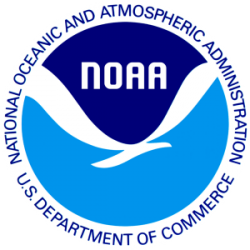
NOAA – Ecosystem-Based Fishery Management Implementation Plans by Region
NOAA Fisheries has released nine implementation plans that identify priority actions and milestones for Ecosystem Based Fisheries Management nationally and regionally, including for Atlantic highly migratory species, for the next five years. Each plan identifies milestones for a specified geographic area. The milestones relate to six guiding principles laid out in the 2016 EBFM Policy and Road Map >click to read<13:03
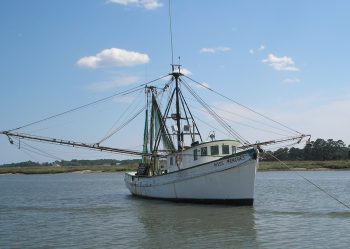
Saving Fishing Into The Future, Rocky Novello
Most all fishermen in the U.S.A., are having the same problems in fishing which include: NOAA Fisheries which uses outdated science, and outdated fishing regulations, which should have been changed as our oceans were changing. The big environmentalist organizations, funded by big oil, who collectively spent hundreds of millions of dollars getting rid of many our fellow commercial fishermen from so many places. They did a great job.,,, >click tor read, and comments from others will appreciated<10:40
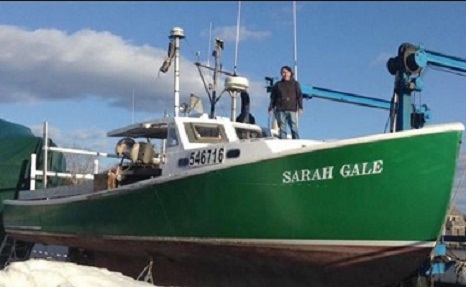
Please support our local commercial fishermen
If you don’t think commercial fishermen are an endangered species – think again. I have been very vocal over the years about my feelings on the commercial fishing industry being in jeopardy, and highlighting the importance of just what an integral part the industry plays in not only the economy, but the infrastructure as a whole, not only in our town and coastal towns across America. As someone with deep ties to our community and the fishing community in particular, I am in a unique position working as a mate on a commercial fishing vessel, and being a journalist. I see so much firsthand that I hope the general public will take into account when I write about it. So here I go again, with more food for thought on an issue that is near and dear to my heart. Thank you for reading, Shelley Wigglesworth >click to read<16:43
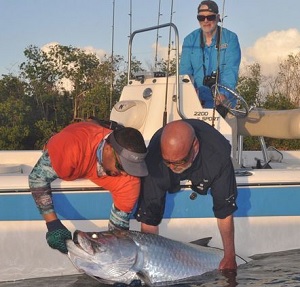
New Law Would End Most Sport Fishing in Puerto Rico
Puerto Rico is on the cusp of approving new law governing fishing in the country, and it threatens to spell the end of recreational fishing. Senate Bill 1014, recently approved by the Puerto Rico Senate will replace current fishing law, known as Law 278, with provisions antithetical to the commonwealth’s sport fishermen and its significant recreational fishing industry. The legislation, if approved by the Puerto Rico House of Representatives, will offer greater latitude to the island’s 900 commercial fishermen, while severely and unreasonably restricting roughly 200,000 recreational anglers, effectively ending a sport estimated to contribute $100 million to the country annually. >click to read<12:58
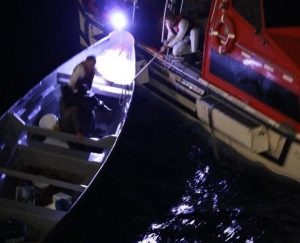
A Christmas Miracle – Cruise Ship Rescues Fishermen Lost at Sea for Three Weeks
Two fishermen have been rescued by a cruise liner after drifting out at sea for 20 days in what was described as a “Christmas miracle.” The sailors had been in the Caribbean Sea for nearly three weeks after their ship ran out of petrol when they were blown off from their gear during strong winds. The sailors had reportedly gone days without water, leaving one of the men unable to walk at the time they were rescued.The men were saved by the cruise only after it was forced to alter its original route toward Cuba because of a recent storm in the area. >click to read<09:28

To our valued readers here at Fishery Nation.
To our valued readers here at Fishery Nation. You have probably noticed recently there have been no postings on our website. I’m sorry to say that I have recently taken ill and have been hospitalized for the past week in the intensive care unit of my local hospital.
As you know, I’ve made it a priority in my life to keep you all informed on the goings on in our commercial fisheries here in the US and also abroad with stories and information that we feel is important to you, and also stories of interest. For the past seven years we have fulfilled this goal 365 days a year, every single day!
Please bear with me as we get through this situation and I am able to get back on my feet and continue what has become my passion, and mission in life, to keep the commercial fishermen informed and up to date as to the goings on in your industry.
If all goes well this will be a short period of time and I’ll soon be on my feet and able to get back at it.
Thank you one and all for your support and understanding. God bless you all, stay safe out there and please stay in touch with us.
Sincerely,
Borehead
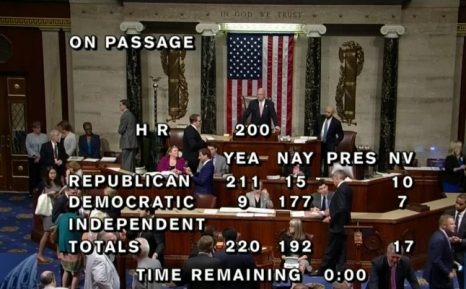
The MSA and Don Young’s partisan dilemma
“We must remain committed to the bipartisan, bicameral tradition of fisheries management,” Rep. Don Young wrote last Sunday, “and my legislation accomplishes just that.” He was referring to the reauthorization of Magnuson-Stevens Act. But when the House passed it on Wednesday, only nine Democrats voted in favor of it. Which explains why, in the same opinion piece, Young complained about “the hyper-partisan mentality” his “Democratic colleagues subscribe to.” Like the breakup of a marriage, there are two sides to this story. The reason why Young is arguing from both might be that he was caught in the middle. >click to read<09:00
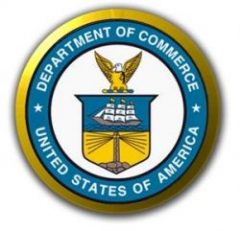
U.S. Commerce Department Announces Appointments to Regional Fishery Management Councils for 2018
The U.S. Commerce Department announced the appointment of 30 members to the eight regional fishery management councils that partner with NOAA Fisheries to manage ocean fish stocks. Twenty-nine of the new and reappointed council members will serve three-year terms from August 11, 2018 through August 10, 2021. One appointed member is filling an at-large seat recently vacated on the Western Pacific Fishery Management Council and this member will serve through August 10, 2020. >click to read<17:02
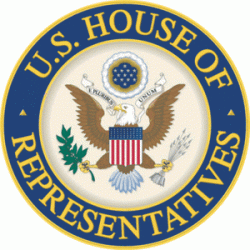
U.S. House set to vote on key fisheries bill, HR-200, Tuesday
It’s called the Strengthening Fishing Communities and Increasing Flexibility in Fisheries Management Act, or H.R. 200. It’s also referred to as the Modern Fish Act. Its author, Rep. Don Young, says the bill would update and improve the Magnuson Stevens Act, the primary law that guides federal fisheries regulators. “Reauthorizing the MSA will ensure a proper balance between the biological needs of fish stocks and the economic needs of fishermen and coastal communities,” Young said after the House Natural Resources Committee approved his bill in December. “MSA has not been reauthorized since 2006. It is long past time for this Congress to act and support our nation’s fisheries.” >click to read< Read the HR-200 Bill->click here< 08:39

Lets get every Rep. in the House to Co-Sponsor “American Fisheries Advisory Committee Act” S1322
Greetings from Gloucester! My name is Sam Parisi, and as some of you know, I have been concerned with the process of how S-K Funds, and distribution of the funds have been handled by NOAA.
I have asked our Senators to support Bill S1322 and I am happy to say thanks to Angela Sanfilppo, The Mayor of Gloucester, The Mass Lobster Association, the Gloucester Fisheries Commission and fisherman up and down the coast that have contacted Senator Markey who is on the committee, and is now with us in support of this important the bill, which will be going to the House.,, I ask all of you to contact your Congressmen and Senators in your area’s to tell them to vote in favor Senator Dan Sullivan’s bill, the “American Fisheries Advisory Committee Act”, S1322. >click to read<18:01







